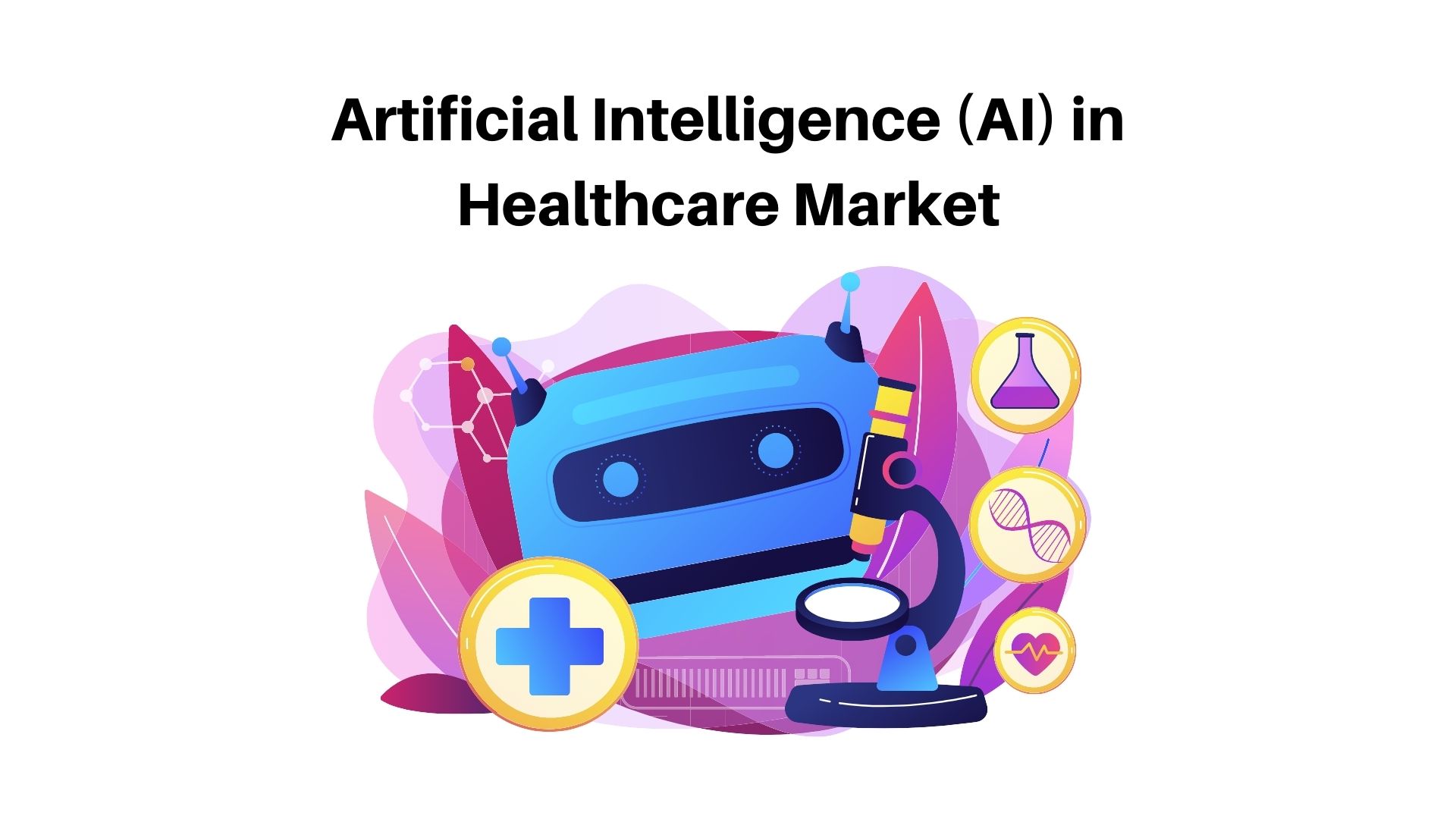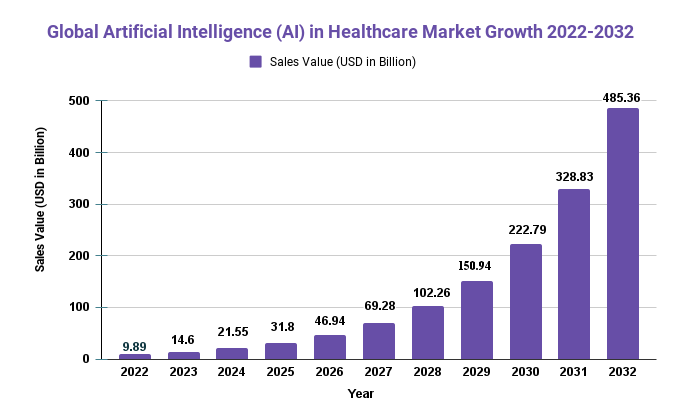Artificial Intelligence (AI) in Healthcare Market Size USD 485.36 Bn by 2032| at a CAGR 47.6%

Page Contents
Market Overview
AI has the potential to revolutionize healthcare by offering personalized treatments, diagnosing diseases, and streamlining clinical workflows. With the increasing adoption of electronic health records and pressure to cut costs in healthcare, along with an exploding amount of patient data, there is an increasing demand for AI in this space.
Artificial Intelligence (AI) in the Healthcare market is a rapidly expanding sector that utilizes advanced artificial intelligence technologies to analyze healthcare data, prescribe personalized treatments and enhance clinical processes. AI holds promise to bring predictive insights, and reduce expenses while improving patient outcomes.
The market is driven by the rising adoption of electronic health records, the need to cut healthcare costs, and an ever-increasing amount of healthcare data. The natural language processing segment is expected to experience the highest compound annual growth rate during the forecast period.
Global Artificial Intelligence (AI) in Healthcare market value is expected to reach USD 485.36 Bn by 2032 from USD 9.89 Bn in 2022, growing at a compound annual growth rate (CAGR) of 47.6% between 2023 and 2032.
For further details on major revenue-producing segments, request a pricing optimization software market Request for a PDF sample report

Key Takeaways
- The global AI in the Healthcare market is expected to reach USD 485.36 Bn by 2032, growing at a compound annual growth rate (CAGR) of 47.6% during the forecast period.
- AI holds great promise for revolutionizing healthcare by offering personalized treatments, predicting diseases, and streamlining clinical workflows.
- North America currently dominates the market, followed by Europe and Asia-Pacific.
- Natural language processing is expected to experience the highest compound annual growth rate during the forecast period.
- The increasing adoption of electronic health records, the need to reduce healthcare costs, and an abundance of healthcare data are driving demand for AI in healthcare.
Regional Snapshot
The global AI in Healthcare market is divided into North America, Europe, Asia-Pacific, Latin America, and the Middle East & Africa. North America dominates this segment followed by Europe and Asia-Pacific. North America is expected to remain at the top of the forecast period due to the high adoption of AI technologies within healthcare facilities as well as the presence of major market players there.
Drivers
- The growing adoption of electronic health records.
- The need to reduce healthcare costs.
- The growing amount of healthcare data.
- Personalized medicine's growing demand.
- A shortage of healthcare professionals.
“Damage control at its finest”, according to this document from UNESCO. In the healthcare industry, large and complex data, often referred to as big data, is generated from clickstream activities and web & social media interactions; readings from medical devices like sensors, electrocardiogram (ECGs), X-rays and pulse oximeters; healthcare claims and other billing records; Electronic medical records (EMRs), prescriptions and biometric information are just some of the sources. Big data and emerging analytical solutions have seen a meteoric rise in sophistication and adoption over the last decade, as healthcare providers increasingly turn to Electronic Health Records (EHRs), digitized laboratory slides, and high-resolution radiographic images for analysis.
Due to the increasing digitization and adoption of information systems in healthcare, big data is generated at various stages throughout the care delivery process. As a result, healthcare is one of the top five big data industries worldwide – particularly in the US. Government initiatives to foster Al innovations in healthcare will further propel market growth in the US.
Restraints
- High cost of implementation and lack of qualified professionals.
- Security concerns regarding data privacy and protection also need to be taken into consideration.
Al is a complex system, and companies need specialized personnel with specific skill sets for developing, managing, and implementing Al systems. Personnel working with Al systems should be conversant in technologies such as cognitive computing, machine learning and artificial intelligence (ML/AI), deep learning, and image recognition. Integrating Al solutions into existing systems is a difficult undertaking that necessitates extensive data processing to replicate human brain behavior. Even minor errors can cause system malfunction or negatively impact the desired result.
Furthermore, the lack of professional standards and certifications in Al/ML technologies is restricting its growth. Furthermore, Al service providers face difficulties when deploying/servicing their solutions at customer sites due to a lack of technology awareness and fewer Al experts.
Opportunities
- The growing use of AI in clinical trials poses several advantages.
- Furthermore, remote patient monitoring has seen a meteoric rise.
With an increasing geriatric population worldwide, it is expected that the prevalence of age-related diseases will rise. To combat the rising demand for healthcare systems in many countries, governments are turning towards innovative technologies. Al is one such technology, offering enhanced services such as real-time patient data collection and monitoring for emergency care, along with proactive healthcare recommendations. Furthermore, Al-based tools can utilize health and wellness services like mobile applications to monitor the movement and activities of ss.
Al-based technologies enable effective implementation of in-home health monitoring and information access, personalized health management, treatment devices (like better hearing aids or visual assistive devices), physical assistive devices (like intelligent walkers), as well as treatment devices like better hearing aids. As a result, there has been an uptick in interest in using Al-based technologies to support the physical, emotional, social, and mental well-being of the elderly around the world.
Challenges
- Absence of regulatory guidelines.
- Ethical concerns regarding AI in healthcare.
- Resistance to change within the industry.
The performance of Al algorithms is highly dependent on the quality and availability of data. Thus, limited access to healthcare records poses a major barrier for this market. Due to the difficulty of accessing and collecting medical data, many healthcare professionals opt not to participate in data collection processes because it might disrupt their workflow. Thus, data collection may often go undetected, leading to incomplete records. Electronic healthcare record (EHR) systems are typically incompatible with government-certified providers offering their services to various healthcare facilities and hospitals. As a result, data collection for patients' medical histories is typically localized rather than integrated across providers. Without high-quality and large datasets, it becomes challenging to develop useful Al algorithms.
Grow your profit margin with Market.us – Acquire this Report
Recent Developments
- In September 2020, NVIDIA unveiled its Clara healthcare platform, which utilizes AI and medical imaging to assist healthcare providers with diagnosis, treatment, and drug discovery.
- In August 2020, Cognizant announced the acquisition of Lev, a digital marketing and e-commerce agency, in order to enhance its AI-powered healthcare marketing offerings.
- Amazon Care, the company's healthcare service, was launched in January 2021 with AI-powered chatbots providing virtual healthcare services to employees.
Кеу Маrkеt Ѕеgmеntѕ
By Component
- Hardware
- Software Solutions
- Services
By Application
- Virtual Assistants
- Robot-Assisted Surgery
- Diagnosis
- Fraud Detection
- Administrative Workflow Assistants
- Clinical Trials
- Connected Machines
- Dosage Error Reduction
- Cybersecurity
Маrkеt Кеу Рlауеrѕ
- Google LLC
- Nuance Communications Inc.
- Microsoft
- IBM Corporation
- Welltok
- Careskore
- Intel Corporation
- NVIDIA Corporation
- DeepMind Technologies Limited
- Siemens Healthineers
- Johnson & Johnson
- Micron Technology
- Other Key Players
Interested to Procure the Data? Inquire here at https://market.us/report/artificial-intelligence-ai-in-healthcare-market/#inquiry
Report Scope
| Report Attribute | Details |
| The market size value in 2022 | USD 18.85 Bn |
| Revenue forecast by 2032 | USD 537.51 Bn |
| Growth Rate | CAGR Of 39.8% |
| Regions Covered | North America, Europe, Asia Pacific, Latin America, and Middle East & Africa, and the Rest of the World |
| Historical Years | 2017-2022 |
| Base Year | 2022 |
| Estimated Year | 2023 |
| Short-Term Projection Year | 2028 |
| Long-Term Projected Year | 2032 |
Frequently Asked Questions
Q: What is Artificial Intelligence (AI) in Healthcare?
A: Artificial intelligence (AI) in healthcare refers to the application of advanced technologies like machine learning, natural language processing, and computer vision for analyzing healthcare data, providing personalized treatments, and streamlining clinical workflows.
Q: What are the key drivers of the AI in Healthcare market?
A: The primary factors driving growth in this space include the increasing adoption of electronic health records, the need to cut healthcare costs, and an abundance of healthcare data.
Q: What are the major challenges of the AI in Healthcare market?
A: The major difficulties facing this space include a lack of regulatory guidelines, ethical concerns regarding its use in healthcare, and resistance to change within the industry.
Q: What are the major opportunities for the AI in Healthcare market?
A: The major opportunities in this space include the growing utilization of AI in clinical trials, increasing demand for remote patient monitoring services, and integration of AI with blockchain technology.
Q: Which region leads AI in the Healthcare market?
A: North America commands the majority share of this sector, followed by Europe and Asia-Pacific.
The team behind market.us, marketresearch.biz, market.biz and more. Our purpose is to keep our customers ahead of the game with regard to the markets. They may fluctuate up or down, but we will help you to stay ahead of the curve in these market fluctuations. Our consistent growth and ability to deliver in-depth analyses and market insight has engaged genuine market players. They have faith in us to offer the data and information they require to make balanced and decisive marketing decisions.